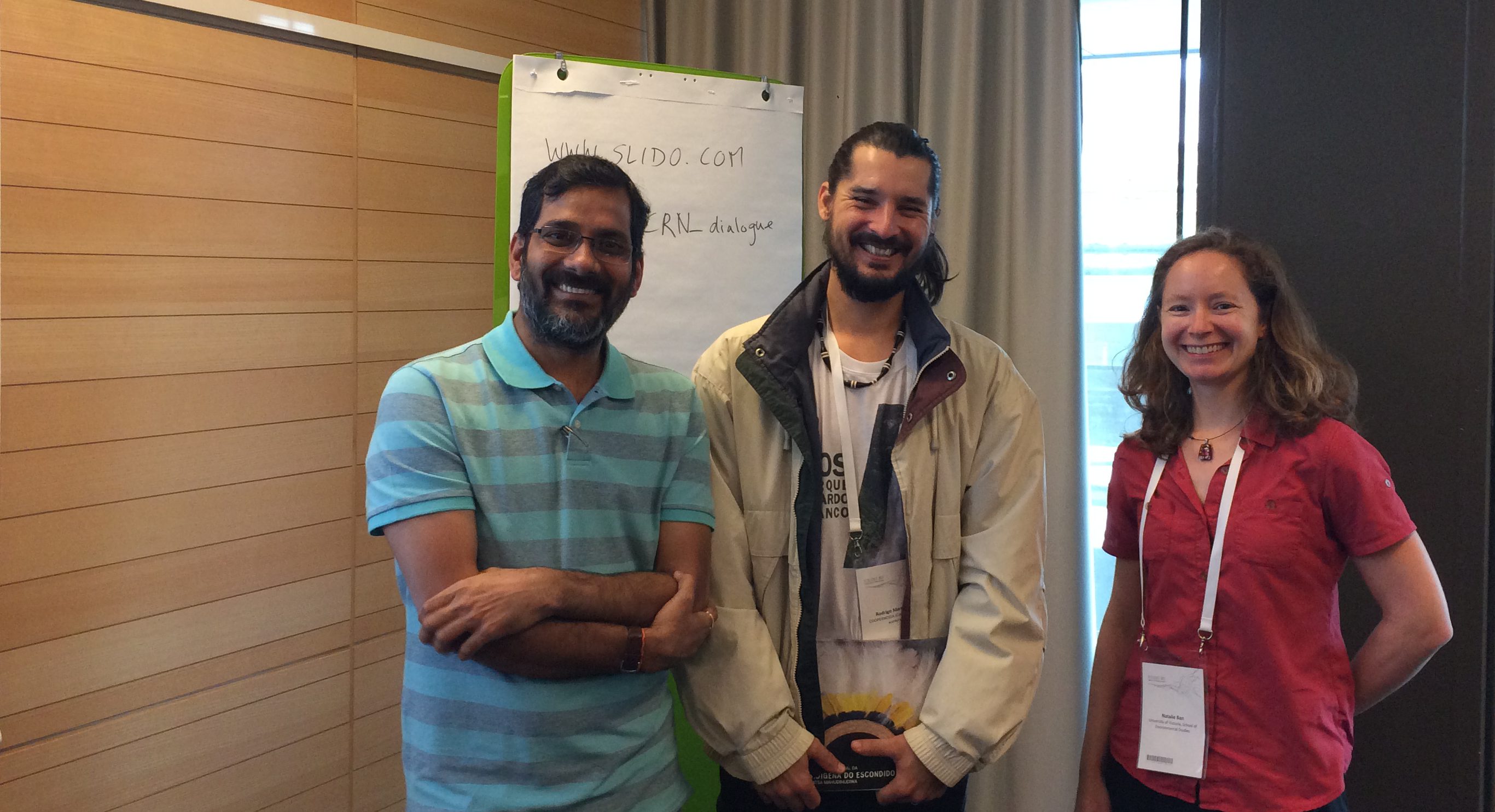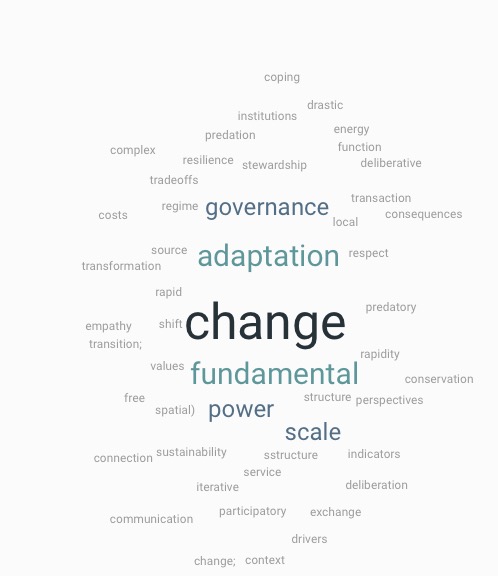
18 Sep Understanding transformation and success in community conservation
CCRN researchers Prateep Nayak, Alison Macnaughton and Tony Charles organized a dialogue session at the triennial Resilience Conference in Stockholm, Aug 23, 2017. The session focused on understanding how success in community conservation is influenced by rapid change and transformation. The session also addressed the challenge of identifying the corresponding key features of effective governance arrangements and policy measures, particularly within contexts of transition and transformation. In addition to presentations from Prateep and Alison, the session included a presentation from Rodrigo Marcelino (Brazil), and a synthesis by Natalie Ban as discussant.
The second half of the session was an audience-participation dialogue focusing on reflection, analysis and distilling key lessons learned, with 36 participants sharing perspectives and questions about community-led transformation. This discussion was supplemented by an online survey ran prior to the conference, using Sli.do an audience interaction software. Responses from participants highlighted the key role of local leadership and innovation (63% of respondents), facing common challenges (46%), participatory engagement (46%) and government support (42%) in achieving successful transformations, in addition to a variety of other elements.

This wordcloud image shows keywords that participants associated with transformation.
Session Abstracts
How can an introduced species contribute to conservation and sustainable livelihoods? The case of paiche fisheries in the Bolivian Amazon.
Alison Macnaughton, University of Victoria, Canada
The Northern Bolivian Amazon is currently experiencing a variety of human and environmental pressures, including urban development, large infrastructure projects, extreme climate events and species introduction. While indigenous peoples hold rights to extensive territories in the region, the development and implementation of governance structures and processes (including natural resource management) within these territories has been limited to date. Recently there has been interest expressed at a variety of levels (communities, government, NGOs) in developing new commercial fishery opportunities based on the introduced paiche fish (Arapaima gigas), which is increasing in abundance and of high commercial value in regional markets. This paper examines the current and potential future role of fishing in indigenous communities as it relates to broader processes of transition and transformation in livelihoods and governance in the region. It includes the results from a study that was carried out in 4 Indigenous Territories in Beni Department, Bolivia between October – November 2015. Results of the study confirm that while subsistence fishing is extensive, with native species as a central part of local diets, the selling of fish is less common, and generally a secondary source of income. Participation in paiche fisheries is very limited among indigenous communities. Many communities face significant problems of food insecurity, poverty and associated environmental and social vulnerability including a significant lack of access to basic services such as health, clean water, transportation access and more. In this context the demand for local projects and income-generating initiatives is high, but the success of initiatives to date has been limited. If paiche fishery development is to be successful, it must be aligned with strategies to address the multiple dimensions of poverty and vulnerability in a more meaningful way. This paper proposes a preliminary framework to examine some of the dynamics of governance and livelihoods transformations, with a focus on fisheries as part of integrated poverty reduction initiatives.
Can secure tenure act as a measure of conservation and governance success in lagoon-based small-scale fishery social-ecological systems?
Prateep Nayak, Faculty of Environment, School of Environment, Enterprise and Development, University of Waterloo, Canada
This paper begins by confirming that issues around tenure within lagoon-based small-scale fishery social-ecological systems have largely been neglected. Despite a growing body of literature on lagoon commons and property rights systems, existing literature on marine and terrestrial tenure tend to subsume tenure issues of coastal lagoons. Lack of specific attention to lagoon tenure can potentially affect their long-term sustainability, undermine ongoing efforts of community-based conservation and further marginalize small-scale fishers that have depended on them for generations. This paper identifies important challenges associated with lagoon tenure in relation to the implementation of the Voluntary Guidelines for Securing Sustainable Small-Scale Fisheries in the Context of Food Security and Poverty Eradication, 2015 (FAO SSF Guidelines), particularly focusing on its provisions for responsible governance of tenure. It highlights that secure tenure rights form the basis of social, economic, ecological and cultural wellbeing of small-scale fishing communities. To this effect, the paper sets forth some of the key conditions for governance of tenure in the context of lagoon small-scale fisheries social ecological systems through an extensive treatment of a broad range of fishers’ rights and multi actor responsibilities. Fisher experiences with the impacts of ongoing rapid social-ecological changes and community responses in Chilika Lagoon, Bay of Bengal, India are used as a case. Additional data comes from a series of workshops, meetings, and consultations with smallscale fishers and other stakeholders in Chilika. Important lessons for governance of lagoon tenure are examined in relation to resource systems, resource sectors, and user-level dynamics to offer insights on the specific characteristics of lagoon small-scale fisheries tenure and possible directions for conservation and governance.


